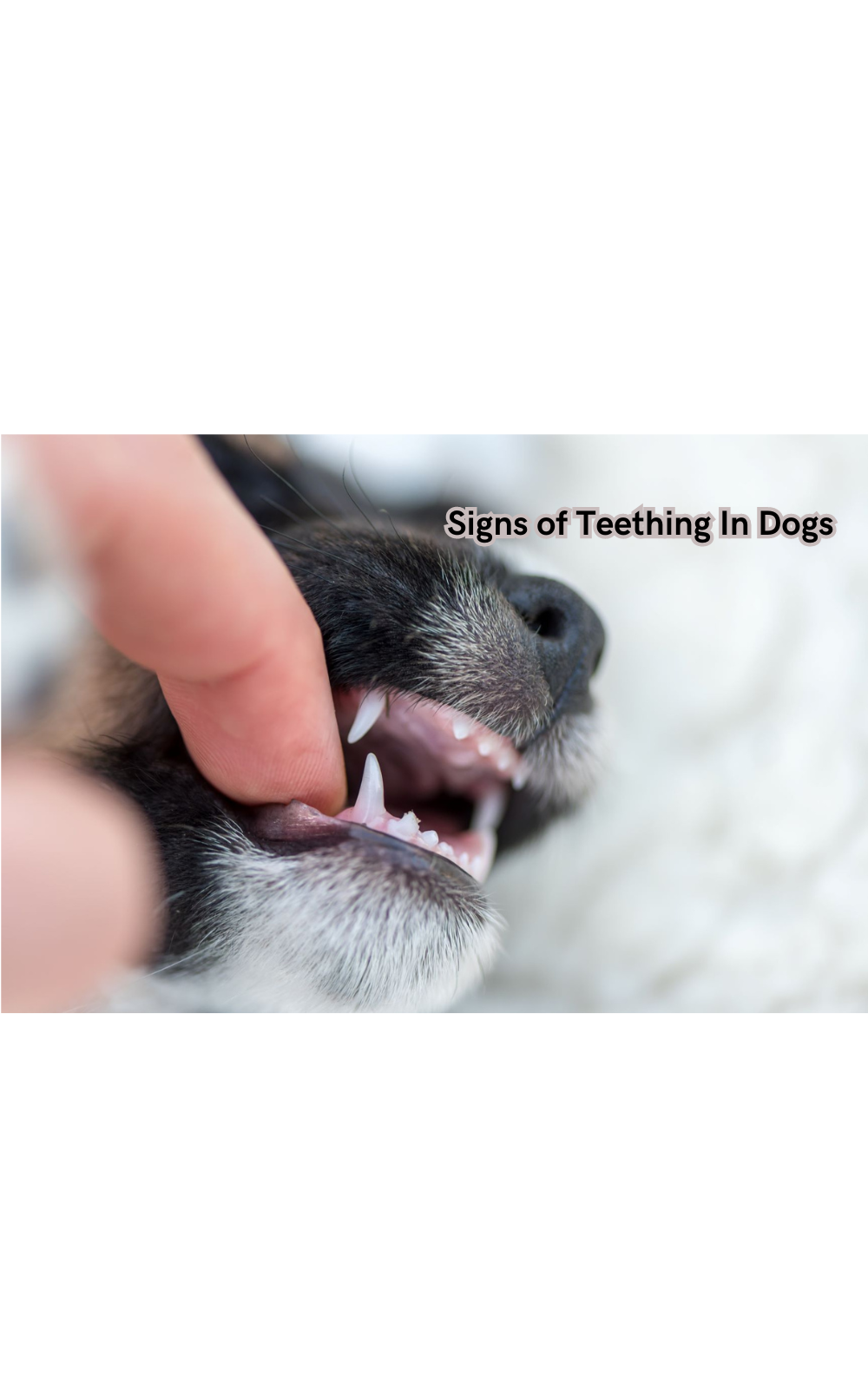Signs of Teething In Dogs
From excessive drooling and chewing behavior to inflamed gums and irritability, recognizing these indicators can help you ensure your furry companion's comfort and well-being. Let's explore the critical signs of teething in dogs and how to manage this phase effectively.

Welcoming a new puppy into your home is an exciting experience, and as they grow, it's essential to be mindful of their teething process. Just like human babies, dogs go through teething, which can be a challenging time for both the pup and the owner.
Understanding the signs of teething in dogs is crucial for providing appropriate care and support during this developmental stage. From excessive drooling and chewing behavior to inflamed gums and irritability, recognizing these indicators can help you ensure your furry companion's comfort and well-being.
Let's explore the critical signs of teething in dogs and how to manage this phase effectively.
What Is Puppy Teething?
Puppy teething is a natural process that occurs when a puppy's deciduous (baby) teeth are replaced by their permanent adult teeth. This typically starts around the age of 3-4 months and can last up to 8 months. During this time, puppies may experience discomfort and pain as their teeth push through their gums.
When teething puppies chew on objects, it helps relieve this discomfort by massaging their gums. Before a puppy's adult teeth come in, their gums are sensitive and may be easily irritated. As a result, it's essential to provide proper care and support during this stage.
Like human babies, puppies will commonly want to chew on objects and may experience changes in behavior during this process. Time to deciduous teeth loss may vary, but teething is a natural part of development that all dog owners should be prepared for.
When Do Puppies Start Teething?
Puppies can start teething as early as three weeks old when they begin to develop their baby teeth. This process continues until all of their deciduous teeth are replaced by adult teeth, typically around 6-8 months of age. It's essential to keep an eye out for signs of teething so you can provide the necessary support and prevent any potential issues.
Furthermore, the teething process is only sometimes a smooth one. Some puppies may struggle more than others, and some may experience delayed or early teething. It's essential to monitor your puppy's teeth development and consult with your veterinarian if you have any concerns.
Physical Signs of Teething in Dogs
The following signs are common puppy teething symptoms that your dog is going through the teething process:
Excessive Drooling:
One of the first signs that your puppy is teething is excessive drooling. As their teeth start to push through the gumline, puppies' saliva production increases, causing them to drool more than usual. You may notice wet spots on your pup's fur or excessive shaking of their head during this stage.
Chewing Behavior:
One of the most common behaviors associated with teething is excessive chewing. Puppies will often try to relieve their discomfort by chewing on objects, such as toys, shoes, or furniture. It's crucial to provide your puppy with appropriate chew toys and discourage them from destructive chewing.
Inflamed Gums:
As the puppy's teeth push through their gums, they may become swollen and inflamed. You may notice redness, tenderness, and even bleeding in some cases. Swollen gums can be uncomfortable for puppies, and they may exhibit signs of pain or discomfort while eating or chewing.
This is entirely normal during the teething process, but if you have any concerns, consult with your veterinarian.
Irritability:
Just like human babies, puppies can become irritable and moody during teething. They may experience discomfort or pain while eating or yawning, leading to changes in behavior.
Puppy teeth are sharp, and their gums may be sensitive, causing them to be more irritable at times. Baby tooth aches are not fun for anyone, so it's essential to be patient and understanding during this phase. Be patient with your puppy during this stage, and provide plenty of love and comfort.
Behavioral Signs of Teething in Dogs
Aside from physical signs, you may also notice other changes in your puppy's behavior during the teething process:
Appetite Changes:
Teething can cause discomfort while eating, leading to a change in appetite. Some puppies may lose their appetite, while others may seek more comfort in food and overeat. Monitor your puppy's diet and consult with your veterinarian if there are any significant changes.
Changes in Sleeping Patterns:
The discomfort of teething can also affect puppies' sleeping patterns, leading to restlessness or difficulty falling asleep. Be patient and provide a comfortable environment for your puppy to sleep in during this stage.
Destructive Behavior:
Along with excessive chewing, puppies may also exhibit other destructive behaviors, such as ripping apart furniture or getting into the trash. This is often due to their need to relieve discomfort through chewing and can be prevented by providing appropriate chew toys.
Whining or Whimpering:
Puppies may vocalize their discomfort through whining or whimpering during the teething process. Pay attention to these sounds and provide comfort and support to your puppy.
During the puppy teething process, it's crucial to be patient and understanding. By providing appropriate care and support, you can help your furry friend through this phase and ensure healthy teeth development.
How to Manage Teething in Dogs
While teething is a necessary part of your pup's development, there are ways to manage and minimize discomfort during this stage:
Provide Appropriate Chew Toys:
Chewing is a natural behavior for dogs, especially during teething. Make sure to provide your puppy with appropriate chew toys that are safe and durable. Avoid objects that may be harmful or too hard, which can damage their teeth.
Massage Their Gums:
Massaging your puppy's gums can help relieve discomfort and promote healthy teeth development. You can use a clean, damp cloth or a finger toothbrush to massage their gums gently in a circular motion. This can also help alleviate inflammation and soothe swollen gums.
Use Cold Compresses:
Just like with humans, cold compresses can be an effective way to reduce swelling and soothe discomfort in teething puppies. Wrap a clean cloth around an ice pack or put a wet cloth in the freezer for a few minutes, then gently apply it to your puppy's sore gums.
Consult With Your Veterinarian:
If you have any concerns or notice excessive pain or discomfort during your pup's teething process, consult with your veterinarian. They can provide additional tips and recommendations to help manage your puppy's teething.
When Do Puppies Lose Their Teeth?
Puppies usually lose their deciduous teeth in a specific order, starting from the front incisors and ending with the molars. As they lose each tooth, it is replaced by an adult one. This process can be quite painful for puppies, so it's essential to provide them with appropriate chew toys and treats to alleviate discomfort.
Additionally, monitoring their teeth development and ensuring healthy oral hygiene practices can help prevent any potential issues.
When Do Puppies Stop Teething?
Puppies typically stop teething between 6 and 8 months of age when all their adult teeth have come in. During this time, you may notice that your puppy's chewing behavior decreases as they no longer experience discomfort from teething. Adult teeth may completely replace milk teeth at this stage. Sharp teeth may still be present for a while, but they will eventually wear down and become less noticeable.
However, it's essential to continue providing appropriate chew toys and monitoring their dental health throughout their life.
How Many Teeth Do Dogs Have?
Puppies have 28 baby teeth, also known as deciduous teeth, which will eventually fall out to make way for their adult teeth. Adult dogs typically have 42 permanent teeth, consisting of incisors, canines, premolars, and molars. However, certain breeds may have fewer or more teeth due to genetics.
Additionally, different breed sizes may also affect the number and size of their teeth. It's essential to regularly check your dog's dental health and consult with your veterinarian if you notice any abnormalities or issues.
Tips for Maintaining Healthy Teeth in Dogs
In addition to managing teething, it's crucial to maintain healthy teeth and gums in dogs. Here are a few tips to help keep your furry friend's smile bright and healthy:
- Regularly brush your dog's teeth with a pet-friendly toothbrush and toothpaste.
- Provide dental chews or treats that can help clean their teeth and freshen their breath.
- Periodically check for any signs of dental issues, such as bad breath, swollen gums, or discolored teeth.
- Schedule regular dental check-ups with your veterinarian to ensure optimal oral health for your dog.
FAQs
How do I know if my dog is teething?
Some signs that your dog may be teething include excessive chewing, drooling, changes in appetite, and irritability. You may also notice that their gums are swollen or that they have a fever.
Is it normal for my puppy to lose teeth?
Yes, puppies will naturally lose their deciduous teeth as they transition into adulthood. This process typically occurs between 3-7 months of age.
Are there any breeds that are more susceptible to dental issues?
Yes, certain breeds may be more prone to dental problems due to their genetics and physical characteristics. These include small breeds, brachycephalic (short-nosed) breeds, and those with crowded or misaligned teeth. It's essential to pay extra attention to these dogs' dental health and schedule regular check-ups with their veterinarian.
Do dogs cry when teething?
Yes, some dogs may cry or whine during the teething process due to discomfort and pain. Providing appropriate care and support can help alleviate their discomfort and make them feel more comfortable and secure during this phase.
Conclusion
In conclusion, being attuned to the signs of teething in dogs is essential for promoting their overall health and happiness. By recognizing symptoms such as excessive drooling, chewing on objects, inflamed gums, and behavioral changes, pet owners can provide appropriate care and support during this natural developmental phase.
Offering teething-specific toys, maintaining a soothing environment, and providing gentle dental care can help alleviate discomfort and minimize destructive behaviors.
Additionally, regular veterinary check-ups ensure that any teething-related issues are promptly addressed. Ultimately, a proactive and empathetic approach to managing a dog's teething period fosters a strong bond between owners and their canine companions, setting the foundation for a lifetime of well-being and companionship.
